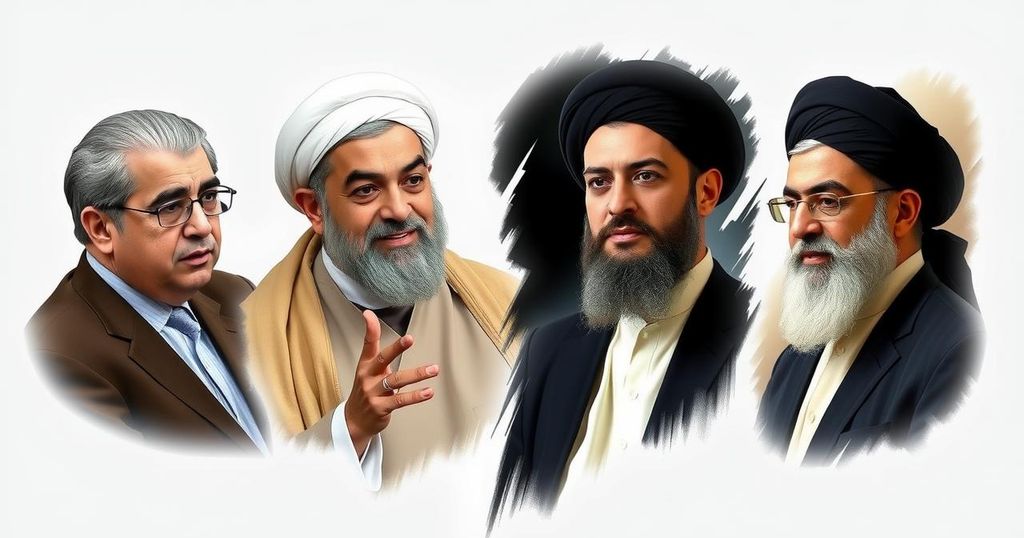Global news
ASIA, ASS, BASHA, BASHAR AL - ASSAD, CIVILIAN CASUALTIES, CONFLICT, EUROPE/ASIA, HAY ’ AT TAHRIR AL - SHAM, HEZBOLLAH, IRAN, ISRAEL, LEBANON, ME, MIDDLE EAST, MIDDLE EAST AFFAIRS, MIDDLE EAST EYE, NORTH AMERICA, PALESTINE, REC, SYRIA, TAYYIP ERDOGAN, TURKEY, UNITED STATES
Fatima Khan
0 Comments
Iranian Establishment Divided Over Response to Assad’s Fall in Syria
The collapse of Assad’s regime in Syria has led to divisions within Iran’s establishment, revealing a surprising lack of preparedness among Iranian authorities. While some factions criticize the government’s past support for Assad, others view the situation as an opportunity to rethink Iran’s foreign policy. This transitional phase raises concerns over Hezbollah’s power in Lebanon and may result in shifting dynamics regarding Iran’s nuclear ambitions.
The fall of Bashar al-Assad’s regime in Syria has elicited a divided response within the Iranian establishment, reflecting confusion and alarm among authorities in Tehran. The rapid advancement of rebel forces surprised Iranian officials, who had not anticipated the quick collapse of the Syrian army, especially following Hezbollah’s withdrawal to confront Israel in Lebanon. In light of Israeli air strikes targeting Iranian and Hezbollah positions, Iranian sources expressed their inability to effectively respond to the evolving situation in Syria.
As the rebels neared Damascus, Iranian state media notably adjusted their narrative, shifting from labeling the rebels as “terrorists” to describing them merely as “armed groups.” Reports emerged indicating that Iran had secured assurances from Hay’at Tahrir al-Sham (HTS) regarding the protection of sacred Shia sites, a move intended to calm internal unrest among religious supporters of the establishment. However, reactions within Iran varied significantly, with critiques from conservative elements suggesting that the government had inadequately supported Assad.
Some Iranian reformists viewed these developments as a necessary recalibration of Iran’s foreign policy, perceiving the collapse of Assad’s regime as a beneficial opportunity to reassess its approach to regional alliances and rivalry with Israel. A reformist journalist reflected this sentiment, arguing, “Iran has paid a high price for its stupid and religious foreign policy.” In contrast, there were voices within the establishment advocating for ongoing engagement with HTS and the establishment of new proxies within Syria to maintain influence.
In public statements following Assad’s demise, Supreme Leader Ayatollah Ali Khamenei emphasized the resilience of the Resistance Front and predicted that the fall of Assad would not undermine Iran’s strategic interests. Iranian officials speculated potential openings amidst discontent from regional powers like the UAE and Saudi Arabia toward political movements in Syria. Experts suggested that Iran could utilize the situation to develop a Syrian resistance group confronting Israeli interests as a long-term strategy.
Analysts noted that Iran’s diminishing influence in Syria could have broader implications for Hezbollah’s political power in Lebanon, potentially laying the groundwork for an attack on Iran’s nuclear ambitions. It was posited that a military strike aimed at Iran’s nuclear infrastructure would enable the regime to reconsider its current stance against nuclear armament by framing it as a response to existential threats.
Overall, the aftermath of Assad’s fall marks a critical moment for Iranian foreign policy, necessitating a comprehensive reassessment of its strategies in both Syria and the broader region.
The complexities surrounding Iran’s involvement in Syria have been significantly influenced by the Syrian civil conflict and Iran’s strategic alliances with groups such as Hezbollah. The unexpected swift advance of rebel forces poses a challenge to Iran’s longstanding support for the Assad regime, which has been pivotal in countering perceived threats from extremist groups and Israel. As different factions within Iran reflect on their foreign policy objectives, the internal conflict highlights broader geopolitical implications for the region, with discussions surrounding the future role of Iranian influence in Syria and its impact on neighboring Lebanon.
The fall of Bashar al-Assad has created a fissure within the Iranian establishment, prompting a reevaluation of Iran’s foreign policy and regional strategy. While some factions advocate for maintaining influence through proxy groups and engagement with emerging power dynamics, others view the shift as an opportunity for critical policy realignment away from an outdated ideological framework. The situation remains fluid, with potential repercussions for Iran’s strategic interests in both Syria and Lebanon, and critical implications for its nuclear policy amid external pressures.
Original Source: www.middleeasteye.net




Post Comment